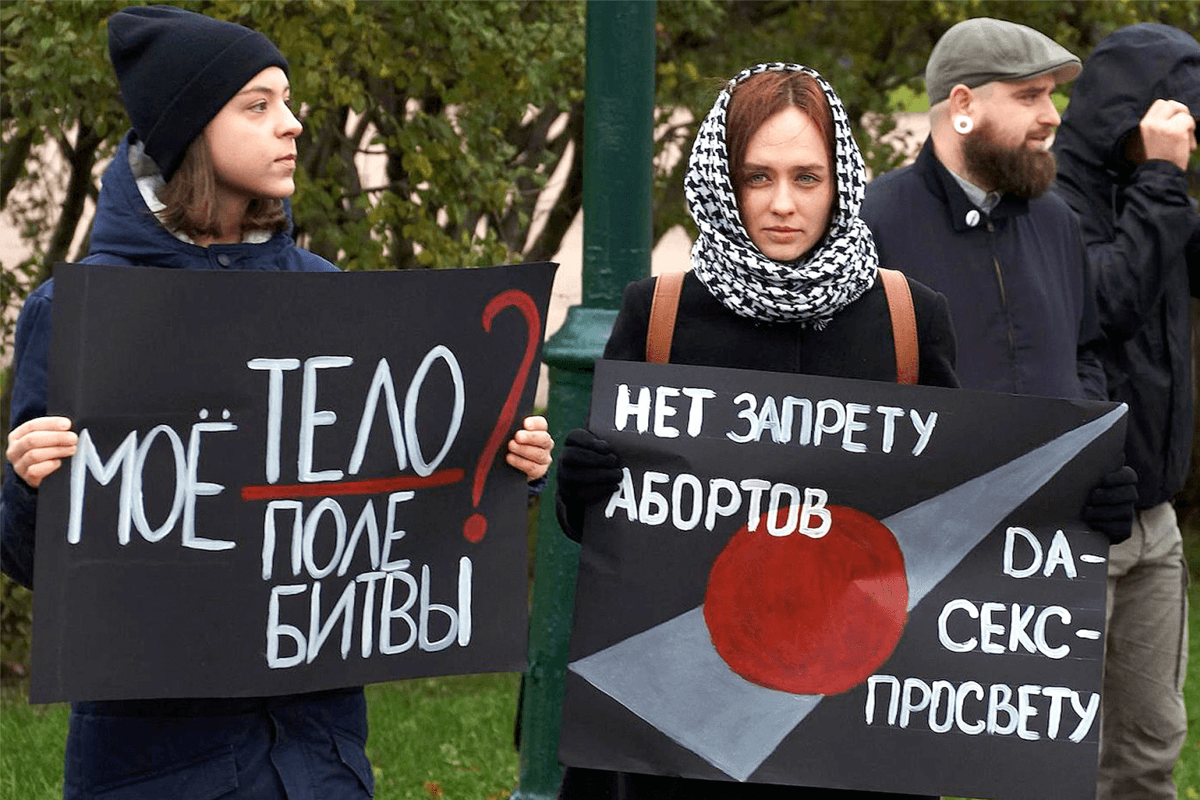
Picket in St. Petersburg in defence of abortion rights
Demand for abortion pills in Russia reached an all-time high in 2022, the Kommersant business daily reported on 2 August, citing data by the RNC Pharma consultancy. A total of 1.4 million abortion pill packets and 2.2 million emergency contraceptives were sold in Russia in 2022, marking a 60% and 53% increase from 2021 respectively.
Women’s support charities told Kommersant that Russia’s invasion of Ukraine in early 2022 and the military mobilisation that followed in September led to a “spike in abortions”.
Yet Russian Health Ministry data shows a different picture, with all types of abortions decreasing by 3.9% from 411,000 in 2021 to 395,000 in 2022. Medical abortions declined by 5.3% from 189,000 to 179,000 over the same period. The disparity between falling abortion rates and rising demand for abortion pills could be due to clinics stocking up on supplies due to fear of shortages amid the threat of Western sanctions, according to experts who spoke to Kommersant.
This year, Kommersant noted that demand for the abortion pills mifepristone and misoprostol fell by 7.4% while demand for emergency contraception continued to grow by 26% in January-May 2023.
Health Minister Mikhail Murashko last month backed limiting the distribution of abortion pills and a ban on private facilities from administering abortions, raising fears that a national abortion ban could be on the horizon amid the government’s conservative turn.
Under current Russian law, women could get an abortion on request up to the 12th week of pregnancy. In some exceptional cases specified in the law, including rape, death of the husband during pregnancy and imprisonment, an abortion may be obtained up to the 22nd week. The system is said to be good overall, but women face obstacles to getting an abortion in several regions. In those regions, a woman may have to travel to a main city to a private clinic, for example. Since 2011, at the instigation of the anti-abortion Russian Orthodox Church, a week’s delay between asking for an abortion and having one was included in the law. Counselling may also be used to discourage women, and though counselling is not obligatory, not all women know that.
In May, ultra-conservative State Duma deputy Vitaliy Milonov proposed to remove abortion on request from the list of procedures covered by state-funded insurance, echoing a similar 2018 initiative in the Duma.
Shortly after Milonov’s proposal, Anastasia Zelentsova, a feminist activist from Chelyabinsk, took to the streets of her native town with a poster attached to a giant coat hanger that read “Excluding abortion from compulsory medical insurance is a genocide of women” ̶ a rare act of defiance at a time when protests are all but not permitted. “Despite the fact that I followed all the rules, law enforcement tracked me down…and took me to the police station, where I spent two hours,” she recalled in a conversation with the Moscow Times. “It feels like the government is doing everything possible to take away the peoples’ will to make their opinion heard.”
The Russian republic of Mordovia has become the first region to ban so-called abortion “propaganda” and the act of “influencing” women to undergo the procedure, the independent media website Mediazona has reported. This includes the misdemeanor of “influencing women to abort”, which encompasses actions that involve “compelling women to undergo abortions through persuasion, offers, bribery, deceit, or by imposing other demands”. Providing pregnant women with information that casts abortion procedures in a positive light also falls under this definition. The law also introduced fines for abortion “propaganda”, which includes activities that “promote [abortion] as a societal norm”, “foster a negative view on pregnancy and childbirth”, convey messages about the “safety and harmlessness” of abortions, or involve making “derogatory statements” about pregnant women and the human fetus.
SOURCE: Moscow Times, by Sergei Kiselev/Moskva News Agency, 2 August 2023 ; Moscow Times, by Leyla Latypova, 27 July 2023 + PHOTO: Alexander Chizhenok / Kommersant ; Moscow Times, 3 August 2023 ; Mediazona, 3 August 2023



